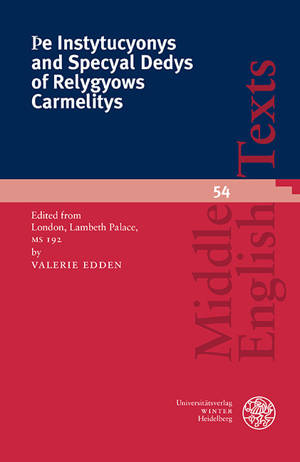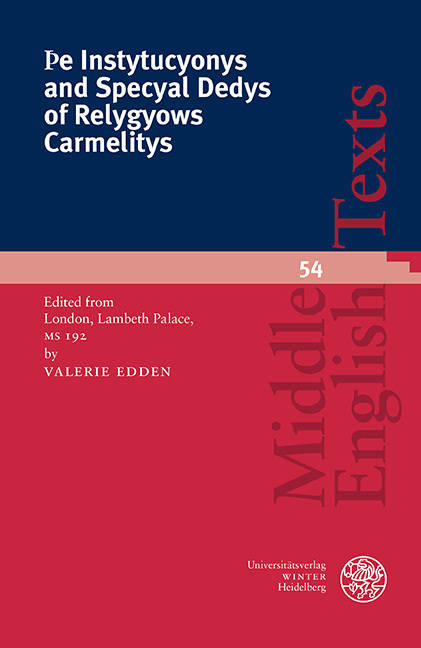
- Afhalen na 1 uur in een winkel met voorraad
- Gratis thuislevering in België vanaf € 30
- Ruim aanbod met 7 miljoen producten
- Afhalen na 1 uur in een winkel met voorraad
- Gratis thuislevering in België vanaf € 30
- Ruim aanbod met 7 miljoen producten
Zoeken
þE Instytucyonys and Specyal Dedys of Relygyows Carmelitys
Edited from London, Lambeth Palace, MS 192
€ 111,45
+ 222 punten
Omschrijving
'þe Instytucyonys and Specyal Dedys of Relygyows Carmelitys' is a Middle English translation of Felip Ribot's 'De institucione et peculiaribus gestis religiosorum carmelitarum decem libri in lege veteri exortorum et in nova perseverancium' (commonly known as 'The Book of the First Monks'). Ribot's work shaped Carmelite identity and spirituality, and was long accepted as the standard history of the Carmelite Order; it provides a valuable insight into late medieval historiography and the Carmelite contribution to the late medieval controversy about the seniority of the various mendicant orders. The fifteenth-century English translation of Ribot's text was made by the Norwich Carmelite friar, Thomas Scrope, also known as Thomas Bradley, and adds much to existing knowledge of the spiritual life of late medieval East Anglia. 'þe Instytucyonys and Specyal Dedys of Relygyows Carmelitys' is edited here for the first time from its only surviving copy, London, Lambeth Palace Library, MS 192. It is prefaced by an Introduction which discusses Ribot and his text, and its importance both in its own time and subsequently for the Carmelite Order; a biography of Thomas Scrope (Bradley), and an analysis of his translation, are also included. The edition of the text is supported by a commentary and a glossary.
Specificaties
Betrokkenen
- Uitgeverij:
Inhoud
- Aantal bladzijden:
- 252
- Taal:
- Engels
- Reeks:
- Reeksnummer:
- nr. 54
Eigenschappen
- Productcode (EAN):
- 9783825367091
- Verschijningsdatum:
- 29/11/2016
- Uitvoering:
- Paperback
- Formaat:
- Trade paperback (VS)
- Afmetingen:
- 155 mm x 234 mm
- Gewicht:
- 258 g

Alleen bij Standaard Boekhandel
+ 222 punten op je klantenkaart van Standaard Boekhandel
Beoordelingen
We publiceren alleen reviews die voldoen aan de voorwaarden voor reviews. Bekijk onze voorwaarden voor reviews.







